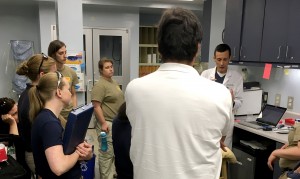
Western University of Health Sciences’ College of Veterinary Medicine Associate Professor of Physiology David Kersey and the Animal Management and Veterinary Teams at Zoo Atlanta performed artificial insemination (AI) on Lun Lun, an 18-year-old female giant panda, on March 28, 2016.
Since 2006, Dr. Kersey has been involved in five breeding events at Zoo Atlanta, in 2006, 2008, 2010, 2013, and 2016.
The teams opted to employ AI when hormonal and behavioral indicators suggested that Lun Lun had entered her species’ critically brief window of fertility, according to a Zoo Atlanta press release.
Female giant pandas are fertile for just two to three days a year, and this short period dictates that AI be performed within hours of ovulation
Kersey, an expert in giant panda endocrinology, began onsite hormone monitoring at Zoo Atlanta on March 20, five days after noting the changes in hormones that precede estrus. He detected a hormonal change associated with ovulation on the morning of March 28.
“In all breeding years, we provided opportunities for natural mating; however, the mating pair do not have a history of natural mating,” Kersey said. “Therefore, when we determined that the signs were not present for mating this year, AI was left as the only opportunity for fertilization this breeding season.”
Copper Aitken-Palmer, DVM, Chief Veterinarian at the Smithsonian Conservation Biology Institute and an expert in giant panda reproductive physiology, and Dr. Kersey assisted the zoo’s Animal Management and Veterinary Teams in the AI procedure.
“Time is of the essence in giant panda breeding season. Giant panda females are known for their ephemeral period of fertility, and our pair, as in previous breeding seasons, did not demonstrate interest in mating this year,” Hayley Murphy, DVM, Vice President of Animal Divisions at Zoo Atlanta said in a press release. “Given Zoo Atlanta’s long-term investment in this endangered species, and given the success of our giant panda program thus far, we are hopeful that Lun Lun, who has proven herself to be an outstanding mother, will once again be able to bring a new addition to a population of animals that have become global icons for the conservation of wildlife and wild places.”
Lun Lun and male Yang Yang, also 18, have never mated naturally in their 17 years of association. All five of the pair’s offspring have been products of AI. The pair’s first three cubs, male Mei Lan, born in 2006; male Xi Lan, born in 2008; and female Po, born in 2010, now reside at China’s Chengdu Research Base of Giant Panda Breeding. Their fourth and fifth offspring, females Mei Lun and Mei Huan, born in 2013, reside at Zoo Atlanta. Mei Lun and Mei Huan are the only giant panda twins in the U.S.